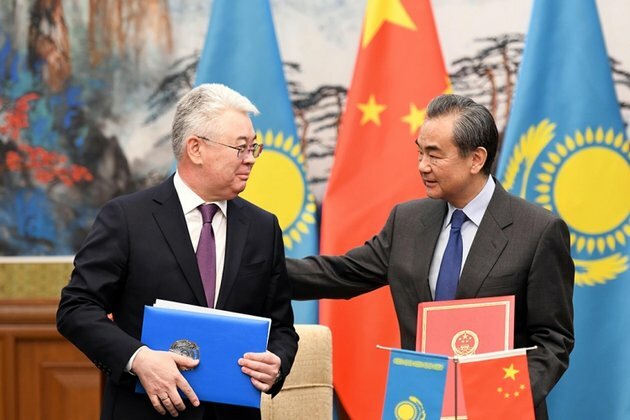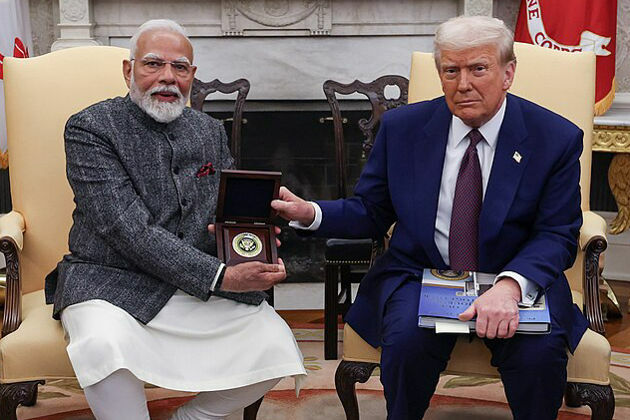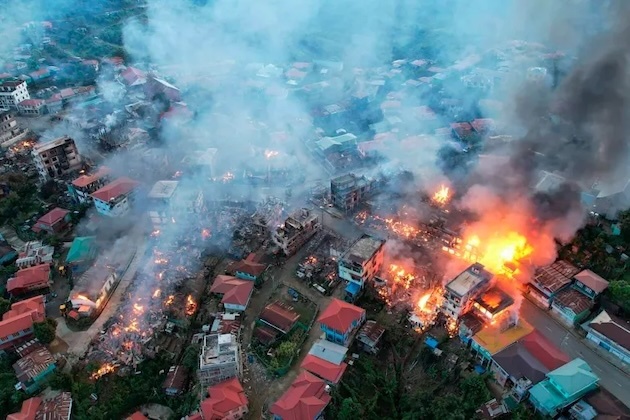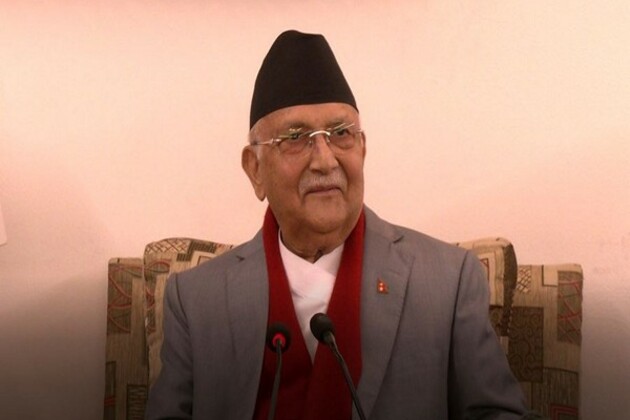Kazakhstan tries to slip from Xinjiang vice, gets ever more stuck
Eurasianet
05 Apr 2019, 19:19 GMT+10

Try as it might, Kazakhstan cannot shake its Xinjiang headache.
On one hand, it needs to temper domestic fury stoked by Nur-Sultans perceived failure to give succor to ethnic Kazakhs caught up in anti-Muslim internment campaigns in Chinas far-flung western regions.
Doing so, however, risks enraging officials in China, a vital economic partner for Kazakhstan.
Kazakh Foreign Minister Beibut Atamkulov emerged from cover last month by adopting the boldest official position to date over the situation in Xinjiang.
Eschewing the terminology favored by Beijing, which euphemistically refers to its interment facilities as vocational training centers, Atamkulovspokein parliament on March 5 about camps. He said his ministry was working on around 1,000 cases involving ethnic Kazakhs that had been brought to the attention of authorities by relatives.
Unfortunately, this pressure is directed not only toward Kazakhs, Atamkulov said in another remark obliquely confirming the scale of the crackdown.
According to some independent assessments, up to 1.5 million Muslims in Xinjiang have fallen prey to the internment campaign. The purpose of this crackdown is said to be to inculcate deeper patriotic sentiments and to pressure internees into shedding their Islamic identities. The majority of those that have been detained are believed to be ethnic Uighurs, Kazakhs, Kyrgyz and Hui.
Atamkulovs willingness to raise the matter in parliament is testament to the effectiveness of activist movements representing the 200,000 Chinese-born Kazakhs repatriated under the governments Oralman program.
His boldness had seemingly diminished, however, when he met Chinese Foreign Minister Wang Yi on March 28 in Beijing.
In a statement, Chinas Foreign MinistryquotedAtamkulov as saying that Kazakhstan understands and supports the measures taken by China's Xinjiang region to crack down on three evil forces" Beijings boilerplate shorthand for terrorism, separatism and religious extremism.
Themedia reportsthat followed, which took the statement at face value as an expression of Kazakh support for Chinese policies in Xinjiang, caused consternation in Nur-Sultan.
The Foreign Ministry dashed off a clarificatorynoteurging the media to correctly convey statements, not to distort, not to replace concepts, and not to take phrases out of context, especially on matters sensitive to the population.
Ethnic Kazakhs living in China were an important factor in friendly relations between Beijing and Nur-Sultan, the ministry added.
Campaigners who have been at forefront of drawing attention to the Xinjiang issue call this an exercise in two-faced public relations.
There are some good people in government that are trying to do what they can for our Kazakhs in China, said Omirkhan Altyn, a Kazakh based in Germany, who in 2017 raised the Xinjiang crackdown at theFifth World KurultaiofKazakhs, a diaspora event attended by then-President Nursultan Nazarbayev.
But its not enough," Altyn told Eurasianet."The Chinese lobby is very strong here. Their money swims around, facilitating our local corruption.
Kazakhstan is not the only country caught floundering in the face of the Xinjiang conundrum.
According to Human Rights Watch, the 57 members of the Organization of Islamic Cooperationfaced concerted lobbyingfrom Beijing not to mention Xinjiang at a ministerial conference last month.
That was a shift of stance from December, when the OICvoiced concerns over developments in the region. A March 2 resolution from the IOC, which includes Kazakhstan among its members, insteadcommendedChina on its treatment of Muslim citizens.
Nur-Sultans handling of the Xinjiang question inside Kazakhstan has been just as clumsy.
Atajurt volunteers Gulzhan Toktaysn, left, and Shynar Kylysheva at the group's Almaty office. (Chris Rickleton)
Last year, authorities dodged considerable outcry when a judge ruled tofreeSayragul Sauytbay, a woman who was facing prosecution for illegally crossing into Kazakhstan from China to join her family.
Sauytbays court testimony about a camp where around 2,500 Kazakhs were interned proved an effective clarion call for politically engaged nationalists.
When she was released, it helped go some way to defusing tensions.
Since then, however, Sauytbay has been refused permanent asylum a status that Nur-Sultan appears to worry could be interpreted as an affront by Beijing. Sauytbay said she has beenpressuredby the security services to drop her asylum bid, but she has persisted undeterred.
Her lawyer, Aiman Umarova,is taking a confrontational approach with authorities.
I have told these [officials]: Your relationship with China is your business. Securing this womans right to live with her family as a citizen is mine, Umarova toldEurasianet.
Sauytbays next appeal is due on April 8.
Umarova also representsSerikjan Bilash, a vocal Xinjiang campaigner who has garnered much popularity for his defense of Sauytbay and countless other ethnic Kazakhs in trouble.
Bilash is currently under housearrest in Nur-Sultanpending investigations into alleged incitement ofinterethnic hatred.
Prosecutors are basing their allegations on what some are describing as the fanciful interpretation of a speech that Bilash delivered in February. In the speech, Bilash called for a jihad against China and its Xinjiang policies, before going on to qualify this campaign as an explicitly non-violent initiative.
When state television aired the speech, days after Bilashs March 10 arrest, itomittedthe passage in which the activist made it clear he did not intend his words to be understood as an exhortation to bloodshed.
Ever since Bilashs arrest,hundreds of his supportershave filmed video appeals demanding his release. Bilash hasreleased his own audio statementcomplaining of directives from authorities to part ways with his lawyer.
While authorities may for now have succeeded in muffling one of Chinas most vitriolic critics, they remain uncertain over what to do with the Atajurt movement he helped create.
The Almaty premises of Atajurt, which has collated a vast trove of testimonies from relatives of Xinjiang detainees, were ransacked and sealed off by police on March 10.
Less than a month later, on April 2, the group announced that the police had once again given them access to their own offices.
We got the key from them," Atajurt volunteer Kairat Baitolatold Eurasianet."We are ready to work again.
 Share
Share
 Tweet
Tweet
 Share
Share
 Flip
Flip
 Email
Email
Watch latest videos
Subscribe and Follow
Get a daily dose of Malaysia Sun news through our daily email, its complimentary and keeps you fully up to date with world and business news as well.
News RELEASES
Publish news of your business, community or sports group, personnel appointments, major event and more by submitting a news release to Malaysia Sun.
More InformationSoutheast Asia
SectionTrump signals progress on India Trade, criticizes Japan stance
WASHINGTON, D.C.: President Donald Trump says the United States could soon reach a trade deal with India. He believes this deal would...
UN Demands End to Myanmar Violence as Junta’s Election Plans Risk Further Instability
Nearly three months after a devastating earthquake struck Myanmar, the country remains trapped in a deepening crisis, compounded by...
Afghan returnees from Iran face homelessness, joblessness; UNHCR seeks urgent aid
Kabul [Afghanistan], July 5 (ANI): A large number of Afghans recently deported from Iran are facing severe challenges, including homelessness,...
Nepal: Nagarik Unmukti Party withdraws support from Oli-led Government, floor test likely
Kathmandu [Nepal], July 5 (ANI): The Nagarik Unmukti Party has decided to walk out of the ruling alliance led by Nepal Prime Minister...
"Should understand dignity of LoP": Sudhanshu Trivedi slams Rahul Gandhi on India-US trade remarks
Raipur (Chhattisgarh) [India], July 5 (ANI): BJP MP Sudhanshu Trivedi on Saturday slammed Congress MP Rahul Gandhi over his remarks...
Numbers etched in history: A deep look into Gill's historic Birmingham outing with the bat
Birmingham [UK], July 5 (ANI): Indian skipper Shubman Gill concluded a record-breaking Birmingham Test against England with breathtaking...
Business
SectionEngine defect prompts Nissan to recall over 443,000 vehicles
FRANKLIN, Tennessee: Hundreds of thousands of Nissan and Infiniti vehicles are being recalled across the United States due to a potential...
Microsoft trims jobs to manage soaring AI infrastructure costs
REDMOND, Washington: Microsoft is the latest tech giant to announce significant job cuts, as the financial strain of building next-generation...
Stocks worldwide struggle to make ground Friday with Wall Street closed
LONDON UK - U.S. stock markets were closed on Friday for Independence Day. Global Forex Markets Wrap Up Friday with Greeback Comeback...
Nvidia briefly tops Apple’s record in AI-fueled stock rally
SANTA CLARA, California: Nvidia came within a whisker of making financial history on July 3, briefly surpassing Apple's all-time market...
ICE raids leave crops rotting in California, farmers fear collapse
SACRAMENTO, California: California's multibillion-dollar farms are facing a growing crisis—not from drought or pests, but from a sudden...
Trump signals progress on India Trade, criticizes Japan stance
WASHINGTON, D.C.: President Donald Trump says the United States could soon reach a trade deal with India. He believes this deal would...












